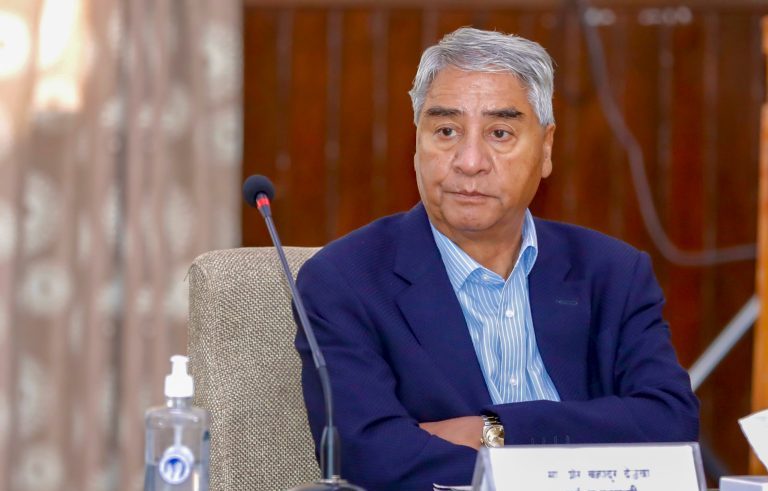KATHMANDU: Nepali Congress (NC) President Sher Bahadur Deuba, popular as a ‘shrewd player’ in Nepali politics, is making concerted efforts to regain the reins of power he lost on March 5.
The effort to create an alternative coalition was halted due to the split of the Janata Samajwadi Party (JSP-N) Nepal. However, Deuba is now working to rebuild his influence and return to power.
Deuba is fostering distrust among the ruling parties in a bid to bring the Nepali Congress back to power after being ousted from the government in a dramatic shift on March 5.
Despite being out of power politics, Deuba remains a formidable figure due to his diplomatic and strategic approach.
While the JSP and Unified Socialist Party were initially left out of the new ruling equation, Deuba is now maneuvering to gain the support of the Unified Socialist party and the Loktantrik Samajwadi Party (LSP).
After the Maoist Center and CPN-UML exited the government, Deuba aims to sustain the minority Madhesh provincial government with support from the Unified Socialist Party and LSP, thereby creating further instability among the ruling parties.
The withdrawal of support by UML and Maoist Center in Madhes has led the government of province, now led by JSP-N, into a minority.
Following the split in JSP Nepal, the federal coalition is seeking to establish a new government in Madhesh.
Despite this, the Unified Socialist Party, led by Madhav Kumar Nepal, continues to support the Saroj Kumar Yadav-led Madhesh government.
Chief Minister Yadav is set to seek a vote of confidence from the state assembly on June 5.
After losing the majority on May 12, Chief Minister Yadav needs to secure a vote of confidence by June 5.
To facilitate this, Nepali Congress President Deuba has sought support from the Unified Socialist Party and LSP.
In a discussion held at his residence in Budhanilkantha, Deuba met with leaders including Metmani Chaudhary of the Unified Socialist Nepal, Mahantha Thakur of LSP, Saratsingh Bhandari, and JSP-N Chairman Upendra Yadav.
Nepali Congress leaders such as Vice President Purna Bahadur Khadka, General Secretary Gagan Thapa, Chief Whip Ramesh Lekhak, and National Assembly Parliamentary Party leader Krishna Prasad Sitaula were also present.
After the meeting, leaders stated that the discussions centered on maintaining the existing government in Madhesh province.
Participants in the Budhanilkantha meeting claim that Nepali Congress will seek the support of the Unified Socialists to increase distrust within the ruling coalition.
“There was a conversation about the Madhesh government. There is a situation where the Unified Socialists have not reached a final decision. Chairman Nepal didn’t say anything clearly,” a top Congress leader who attended the meeting told Khabarhub.
JSP- Nepal Chairman Yadav, who was also present, noted that while there was no specific discussion about the federal government, creating a favorable political environment is a typical strategic move.
He added that NC President Deuba is confident the opposition will not succeed in toppling the current ruling coalition.
Tiwari characterized UML Chairman KP Sharma Oli as a ‘difficult coalition partner’ and the Nepali Congress as a ‘soft coalition partner’ for Prime Minister Dahal.
Meanwhile, political analyst Shankar Tiwari believes there is no need for Nepali Congress to actively try to topple the current ruling coalition.
He recalls that earlier, with the support of UML, Maoist Chairman Pushpa Kamal Dahal ‘Prachanda’ sought an alliance with the Nepali Congress within three months of becoming Prime Minister. Tiwari predicts a similar scenario might unfold again.
“Even before, Nepali Congress did not want the government to fall. After breaking the coalition with UML within three months, Prachanda joined hand with the Congress,” Tiwari told Khabarhub.
“At that time, KP Oli could not sustain Prachanda even for three months. This time, it took three months. The old scene repeats itself.”
Tiwari described Prime Minister Dahal’s previous alliance with the Nepali Congress as a move to escape political suffocation.
“At that time, he came with the Nepali Congress after feeling suffocated. It seems that this time too he is suffocating and feels the need for adequate relief.”
Tiwari characterized UML Chairman KP Sharma Oli as a ‘difficult coalition partner’ and the Nepali Congress as a ‘soft coalition partner’ for Prime Minister Dahal.









Comment